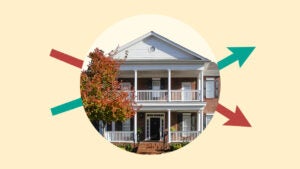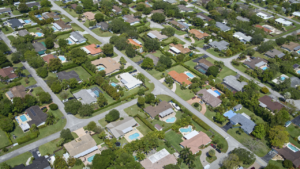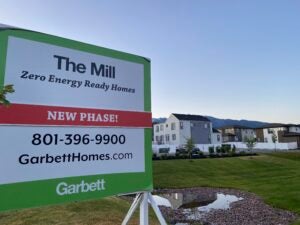U.S. housing market: A nationwide overview

Housing affordability has been top-of-mind for buyers and sellers since mortgage rates started ratcheting up in 2022. A persistent lock-in effect is still keeping many existing homeowners unwilling or unable to sell — which makes sense, when the rate to buy your next home will be double your current rate.
“One word commonly used to describe the economy is uncertainty,” says Mark Hamrick, Bankrate’s senior economic analyst. “That quality undermines confidence, particularly when we’re talking about the biggest, most consequential purchases of a lifetime — namely, buying a home. At the same time, life can dictate the need to buy or sell based on our unique personal situation.”
Uncertainty undermines confidence, particularly when we’re talking about the biggest purchase of a lifetime — buying a home.— Mark Hamrick, Bankrate Senior Economic Analyst
That economic uncertainty could leave mortgage rates stuck in 2025, experts say. What could these elevated rates, coupled with rising home prices, mean for the U.S. housing market in 2025? Here’s how the data breaks down.
Key factors driving the U.S. housing market
- Record-breaking high prices: In March, sale prices of existing homes rose by 2.7 percent from the previous year, marking an all-time high for March prices and the 21st consecutive month of year-over-year increases, according to the National Association of Realtors (NAR).
- Stubbornly low inventory: At the same time, the available inventory of existing homes for sale has been too low to meet demand for quite a while. It remained so in March, despite a sizable year-over-year increase per NAR, with a 4-month supply — 5 or 6 months is typically required for a balanced market.
- Still-elevated mortgage rates: The average rate for a 30-year fixed mortgage also remain stubborn, dipping back below 7 percent but not by much. As of late April, the average was 6.86 percent, according to Bankrate’s weekly survey of large lenders.
- New construction is a mixed bag: The pace of new construction has not been fast enough to meaningfully ease the housing shortage. Housing starts, a metric that measures the beginning of construction on a new residential home, fell by 11.4 percent month-over-month in March 2025, according to the U.S. Census Bureau. While this is a 1.9 percent increase over March of last year, many experts anticipate new construction to be hampered by tariffs and labor shortages in the near future. On the plus side, the National Association of Home Builders reported a healthy 8.9-month supply of new homes in February 2025.
Local markets have their own dynamics
Local market conditions can vary widely by region, state or even individual city. The disparities mean that your money can go much further in some markets than in others.
“Everything’s local — everything’s this local supply-and-demand dynamic,” says Peter Carroll, executive VP of public policy and industry relations for Cotality, a real estate data firm. According to Carroll, this could be due to things like natural disasters, as well as layoffs from major area employers.
Another example of a local trend is flat or declining home prices along the Gulf Coast, says Mike Fratantoni, chief economist of the Mortgage Bankers Association. That includes places in states like Texas and Florida, which have both seen large migrations in recent years.
“That’s where an actually fairly robust amount of inventory is available,” Fratantoni says. “For buyers in those markets, there are some real opportunities.”
Navigating the current housing market
Thinking of buying or selling a home soon? Your experience will vary based on a wide variety of factors. Home prices and mortgage rates are already high, and taxes and homeowners insurance rates are climbing, too. All of these eat into homebuyers’ purchasing power, and make it harder for sellers to find qualified buyers.
While experts predict that the market will cool down eventually, they’re relatively confident that there will not be a housing market crash akin to the Great Recession in the 2000s. This is partially due to today’s much stricter mortgage requirements.
The undersupply of single-family starter homes is 1.6 million units and growing.
The types of homes available add another layer to the housing market. Some housing types are more in-demand than others: “On a national basis, we put the undersupply of single-family starter homes at 1.6 million units and growing,” says Carroll. Factors like tariffs and economic uncertainty could provide extra headwinds in constructing more affordable homes, he adds. Buyers willing to consider a condo or townhouse may be able to get into homeownership at a lower price point.
On the whole, sellers still have the upper hand in most of the country — but that can range wildly from one geographic location to another. “Depending on the market, location and price point, sellers could find either multiple offers or the need to be flexible on price,” says Hamrick.
Should I buy a house now or wait?
Is now a good time to buy a house? Whether to buy now or wait is a big decision that depends a lot on your personal circumstances. Yes, mortgage rates are currently high, but days-on-market figures are up too, giving you more time to make an informed decision. And there’s no guarantee things will improve if you hold off.
Ultimately, deciding to buy a home is a display of confidence in your own finances. Affordability continues to be an issue, but for those who can buy right now, you may see more opportunity than in recent years.
The overall number of homes for sale was up 15 percent year-over-year in March 2025, according to Redfin data. This could mean that you have more choices — and less competition — when it comes to your home purchase.
Should I sell my house now or wait?
Low existing-home inventory levels give sellers the upper hand in most of the U.S. But with mortgage rates and prices remaining elevated, buyers are wary — which makes selling more challenging.
With that in mind, deciding whether now is a good time to sell your house can be tricky. Again, it depends on a number of personal factors. Selling may be a good idea if you’re ready to downsize or retire, or if you need to relocate. But if you’ll then need to buy a new house, the tables will be turned and you’ll be facing the same headwinds buyers currently see. And if your area is likely to be hard-hit by layoffs or a potential economic recession, that will make qualified buyers even more scarce.
Before you list your home, make sure you have a good understanding of how much it’s worth, so you’ll know what kind of profit you stand to make and if it will be worth it.
Next steps
If you think you’re ready to start your homebuying journey, it’s important to keep saving as much as possible and working on your credit. A bigger down payment can save you thousands in mortgage principal and interest in the long run, and a higher credit score will help you snag a more competitive rate, which will also result in a more affordable monthly payment.
If you’re ready to sell, pay attention to the prices homes in your area are asking — and ultimately selling for. Note, too, the impression your home is likely to leave on potential buyers. If some spots could use a bit of sprucing up, now is the time.
Whichever side of the transaction you’re on, be sure to team up with an experienced real estate agent who can help you navigate your local market successfully. A knowledgeable agent can help sellers price and market their home competitively, and help buyers negotiate a good deal on a home that meets their needs. Ask friends and family for recommendations and interview several candidates before settling on the right agent for you.
FAQs
Additional reporting by Ruben Caginalp
Why we ask for feedback Your feedback helps us improve our content and services. It takes less than a minute to complete.
Your responses are anonymous and will only be used for improving our website.
You may also like

The cost of selling a house in New Jersey

Can you afford to buy a home? Can anyone?




